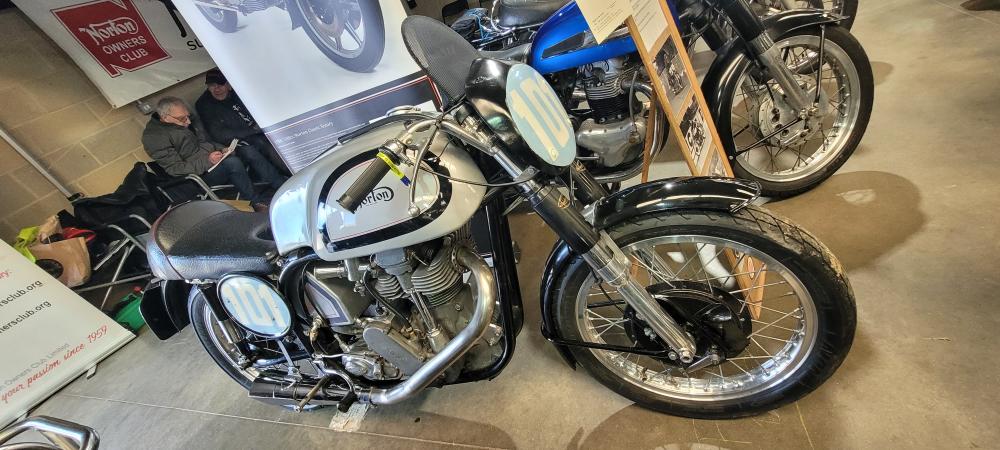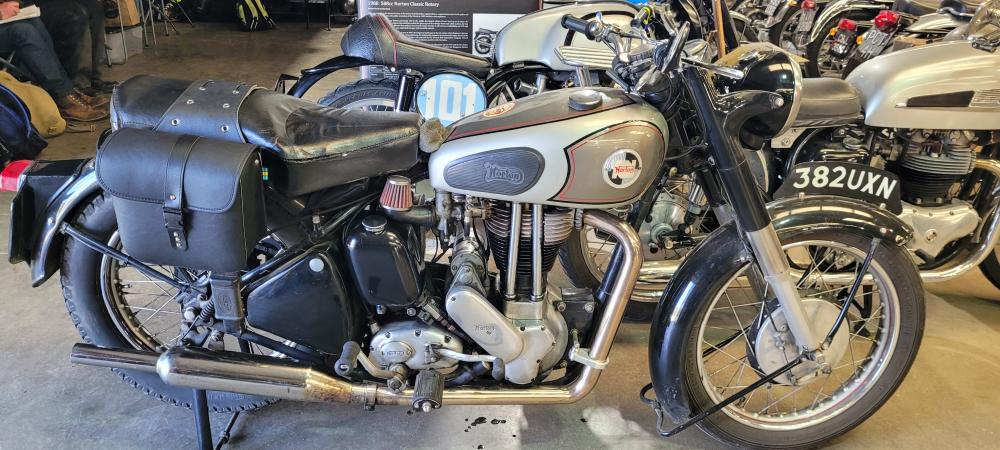Various authors from Roadholder and NOC-L
With the demise of leaded fuel approaches, the alternatives are discussed
| INDEX | |
| Is a head conversion necessary? | Other remedies |
| Can you formulate your own leaded petrol? | Is retiming necessary with unleaded petrol? |
Is a head conversion necessary?
Unleaded fuel appears to cause no problems
Anyone approached for advice is virtually bound to say no, they are just covering themselves. So this is not advice! I spent a few years in the U.S. A. and usually filled up with unleaded premium (91 (R+N)/2), maybe 95-96 RON because my 850 with S.U. carburettor liked the extra octanes. The occasional tank of leaded regular may or may not have restored a cushion of lead on the valve seats; there is not much lead in any of it nowadays. I covered a fair few miles and can't tell you what damage was caused because I haven't looked in there since. There is no external evidence of abnormal valve recession.
Our Eurograde lead-free is lower octane (95 RON) than currently available 4 star, so there is not the incentive to use it (disregarding price and ecology). I am presently trying a tankful and it seems to burn OK without compression plates, retiming or fancy valve seats. The lower octane might be a problem in hot weather, but I don't think so and I'll worry about valve wear when it happens. I suspect the valve seats are self-hardening in use anyway.
Andy Dunn in Roadholder 144, Mar/Apr 1989
Caution recommended regarding upper cylinder lubricants
BMF director John Chatterton-Ross warns that a number of people are jumping on the unleaded bandwagon and exploiting the lack of technical knowledge in the public at large. Manufacturers of upper cylinder lubricants are claiming new formulas designed with unleaded fuels in mind. If a rider wants to use an upper cylinder lubricant in a four stroke, the BMF advises a teaspoonful per gallon of any good quality two stroke oil. More may upset the fuel mixture strength. This is much cheaper than the bottles of branded upper cylinder lubricants.
Note from the BMF in Roadholder 146, Jul/Aug 1989
Tetraethyl lead and valve seat protection
In RH 178, Thomas Ulherr raises the question, can you run a Commando on unleaded fuel. The answer is yes, and no.
The purpose of tetraethyl lead in fuel is to form a fine suspension of lead salts, principally lead bromide, which is the white deposit you can see on piston crowns and exhaust pipe ends, in the burning mixture. The lead salts expelled from the exhaust are well known as the pollutant but they do perform two very important functions as the engine works.
Firstly, the 'cloud' of particles in the combustion chamber slows down flame front propagation from the plug and also masks high intensity electromagnetic radiation emissions from the combustion source which could otherwise trigger secondary ignition sources elsewhere in the chamber. That is to say, it reduces the tendency towards detonation, particularly in high compression engines.
Secondly, the lead salts act as a solid lubricant to protect the valve seats. As exhaust valves settle down into their comfy seats, they tend to 'flutter'. Without the lubricant effect of the lead salts on the soft iron seats, the rubbing action would rapidly cause heavy wear and valve pocketing.
Both these problems can be addressed by modern technology. The new lead free fuels have as good (if not better) resistance to detonation by changing the basic chemistry of the fuel to increase its octane rating. Thus, no changes to ignition timing or compression ratio are needed. Note though that the above applies only to 'Super' grades, since 'Regular' unleaded does have a lower octane rating. Sadly, that is not the whole story, since to avoid valve seat wear it will be necessary to have your old valve seats bored out and replaced with hardened items. Any competent machine shop, and all of the Norton specialist dealers, can carry this out. Unless you are a dedicated environmentalist (and aren't we all?) the cost of the machine shop work may make the lure of cheaper fuel less appealing. In practice, you can probably run one tank in four on unleaded in an unmodified engine without harming it.
While I'm on the subject of fuel, a quick word of warning. Not all fuel, even of supposedly the same grade, is the same. It is not unknown for 'cheapo' filling stations to subsidise their profits by topping up the 4-star tanks with cheap unleaded and selling the lot at 4-star prices. While not a major problem for softer tuned engines, a tankful of this strange brew certainly gave my combat engine indigestion for a while.
Des Senior in Roadholder
650SS has run 30,000 problem-free miles on unleaded fuel
I have read the correspondence in Roadholder concerning the use of unleaded fuel in Norton twin cylinder engines from Thomas Ulherr and Des Senior and would like to say that the technical 'Gen Book' which is now very tatty, says under 'Material':-
Valve seat inserts - Norton twins Part. No. T2226 exhaust and inlet, and 24592 inlet on Atlas are made of Brimol, which it says is austenitic iron.
Alloy heads first appeared on Models 77 and 88 for the 1955 season and when we made some specials in 1958/59, we did not have to change the inlet valve seat because it was satisfactory to open it out to take the larger inlet valve with a head diameter of 1.406" compared with 1.3125" for both valves until then. From 1960 on, the larger inlet valve was standard on 88, 99 and 650.
My information is that austenitic iron is not affected by lack of tetraethyl lead in the fuel and this would be borne out by the experience of a friend of mine who has covered 30,000 miles on a 650SS run entirely on unleaded petrol and he has never had to adjust the tappets. (Mr. Senior correct me if I am wrong). The question arises as to whether the AMC engineers continued to use the original Birmingham drawings and material, and if they did so, did they still do when production moved once more to Wolverhampton.
John Hudson in Roadholder 181, May/Jun 1995
[find information about grades of steel at www.ariba-steel.co.uk/stainles2min.htm - Editor]
Big 4 on unleaded fuel
I have a 1952 Big 4 with a 600 side-valve engine. Having recently burned out the valves after the springs broke, I am having seat inserts fitted to allow me to run on unleaded fuel. Readers considering such a modification will be interested to know that I have found some valves from a Mercedes Benz car [Part No. A 346 053 00 01] which, with a little machining, should be suitable. Will it be necessary to retard the ignition timing to make the engine run right on unleaded fuel?
Alan Hardy in Roadholder 196, Nov/Dec 1997
|
|
[David Kennedy (Technical Editor)]
Can you formulate your own leaded petrol?
Is it possible to formulate your own unleaded fuel using tetraethyl lead?
Lead is a cumulative poison, that is to say that if you come into contact with it regularly, it will build up in your body until it starts to affect you. I understand that a while ago an occupational disease called 'Painter's Cholic' was known. This was found to be caused by lead poisoning due to the lead which was widely used as a pigment and drier in paint.
As for buying the stuff, I'd be surprised if vendors of industrial/commercial chemicals would be interested for product liability reasons. I doubt it would be cheap either, since it is obviously not made in the quantities it was a few years ago. I would imagine that lead tetraethyl would be made by the large oil companies, since they are effectively in the business of chemical manufacture. I thought it would be a blast to do this too, but eventually decided it would be simpler just to build an engine to run on available gasoline - cams, compression, and hard valve seats are things to look at.
It is often put out that only a lowering of compression will compensate for a lower octane fuel. Often a cam with a longer opening will do the same, because it lowers the effective compression ratio at low r.p.m., where pinging always occurs. Lead in fuel effectively prevents the valves from sticking to their seats and tearing them up. Modern valve seat materials will completely eliminate this problem. Inserts can be used to convert older engines. Mick Hemmings should be able to help here; he did on my 650cc twin.
Colin Sharpe (sharpe_colin@videojet.com) on NOC-L 29th. Jun 1998
A source of tetraethyl lead
Genuine tetraethyl lead is available from AMX Enterprises, 7963 Depew St. Arvada, CO. 80003 Tel. + 1 (303) 428-8760. It's sold for $25 per gallon in 2, 4 and 6 gallon cases. This is NOT a substitute. I use it in my 1969 AMX two-seater.
Paul Bannon (amx09914@aol.com) on NOC-L 30th. Jun 1998
Health & safety aspects of tetraethyl lead
Tetraethyl lead is safe enough to handle in leaded gas because there's so little of it, but even the octane boosters sell it pretty diluted so you'll survive if you get some on you. However, if you're going to put straight TEL in your tank with every filling, outdoors in the wind, etc., this could get really tricky.
I am not sure of this but I believe TEL can kill you IMMEDIATELY. It's not like 'smoking and drinking'. I've copied this post to Charles Falco, a physicist on the Brit-Iron list who's very knowledgeable in most areas of motorcycling; he may be able to give us more information on the varieties of doom that straight tetraethyl lead can do to your body.
Mike Taglieri (miketnyc@juno.com) on NOC-L 30th. Jun 1998
Toxicity data for tetraethyl lead
|
After all the interest in this compound, I walked over to the library and looked up tetraethyl lead in the Merck Index. Apart from references on how to make tetraethyl lead, it states that it is Extremely Poisonous! |
Colin Sharpe (sharpe_colin@videojet.com) on NOC-L 30th. Jun 1998
Tetraethyl lead - human LD50
As I recall, given the above stats, and assuming a 100kg rat or similar living species, say human Norton enthusiast, the LD50 at 12.3mg/kg works out to 1.23 grams orally giving you a 50/50 chance of dying (LD50) from the dose. Being the optimist, I like to think of this as 50/50 chance of living.
So if you are dealing with concentrated tetraethyl lead, take heed and consider the above and its implications to you (and others) around.
John Magyar (wimcjjm@aol.com) on NOC-L 30th. Jun 1998
Petrol formulations
For a very comprehensive description of the formulation of gasoline and the effects of differing chemicals on it see www.horizon.bc.ca/f1/gastech.htm. It's written in terms that the average person can understand, and will most likely answer any question you can think of regarding gasoline.
Ken Dubey (kdubey@exchange1.pria.com) on NOC-L 30th. Jun 1998
[see also Jacqueline Bickerstaff's article reviewing the necessity or otherwise of using leaded petrol - Editor]
Tetraethyl lead - more on human LD50
The LD50 is the point at which half the subjects die from an ingestion. Since the average man is 70kg, this works out to about 850mg - about 1cc. [nearer 0.5cc since the density of TEL is 1.653 - Colin Sharpe]. Tetraethyl lead is readily absorbed through the skin and when it first came out in the twenties, there were several people who first went psychotic and then died, from minimal exposure.
Eric William Lamberts (ewl@med.unr.edu) on NOC-L 1st. Jul 1998
Other remedies
A fuel additive
On page 21, RH 178, Thomas Ulherr is asking for some advice concerning the lead free fuel problem. There is a very simple solution, a liquid from Castrol called Benzinzusatz. This is added to the lead free fuel at the ratio of 1:1000.
The thing is, this liquid is manufactured in Austria, where recent legal changes help the motorist keep the original cylinder head without conversion.
Hans Heitmann in Roadholder
Unleaded fuel pellets - beware!
A company in the UK selling some sort of pellets in a wire container that you drop into your fuel tank to allow you to use unleaded fuel were challenged by the MG Owners Club to a highly detailed test with strict monitoring.
I mentioned this about 9 months ago on Brit-Iron and did report that I would post the results of this test. Well, the last MG Owners Club magazine published two letters from the company, the first letter accepting the challenge....and surprise, surprise the second letter declining the challenge. It was interesting that the MGOC published facsimiles of all the letters and not just extracts, so that each reader could make his own judgement with the benefit of having all the correspondence to hand.
Ken Hastie () on NOC-L Oct 1998
No problems with unleaded petrol
When leaded fuel was being phased out, I worried about the seats on my Commando and resigned myself to a complete head overhaul in the near future. And . . . nothing happened.
I switched to 92 octane premium unleaded, my engine purred along, my valves didn't need more adjustment than before, and gradually the articles in the motor press started to reminisce about how everyone had been so hot and bothered over nothing (neglecting to remember that it was their earlier articles that had done much of the heating and bothering).
When I finally had to do a top-end after many years and thousands of miles (and on a Norton Commando I do not putter along....) my seats had a few pits and I needed to lap the valves, but I think that was as much from inadequate winter storage (sometimes outside) as from seat recession. Now I'm back riding on those same seats, and I may keep them again this winter when I finally get the head professionally done, because they don't look all that different than they did when I put this engine together in the mid 1980s.
If I had a very old bike with an iron head I might consider gasoline additives, but otherwise I would just ride and check valve adjustment regularly, and only worry if the clearances seemed to be changing rapidly or especially getting smaller which I think would happen with seat recession.
Mike Taglieri (miketnyc@juno.com) on NOC-L Oct 1998
Hardened valve seats from 1962/63 onwards
Talking to Les Emery some weeks ago about optimising the output from one of my Atlas engined hybrids (all 1968), his 'off the cuff' remark was "well, at least you won't have to worry about unleaded, as Norton used hardened valve seats from '62-63-ish" approx. So, it seems that Commandos should be immune to unleaded fuel?
Colin Steer (goscard@aol.com) on NOC-L 26th. Oct 1998
Is retiming necessary with unleaded petrol?
Is it necessary to retime the engine when unleaded fuel is used?
The good news from the recent internet exchanges seems to be that unleaded fuel will have little or no effect on Commando valve seats. Two queries then about using unleaded fuel:-
- Should the ignition timing be changed?
- Which unleaded fuel is best suited to the Commando - 'Premium' (ordinary or regular unleaded) or 'Super' (higher octane unleaded)?
Roger Fox (rfox@fpdsavills.co.uk) on NOC-L 27th. Oct 1998
Comment on premium vs. super unleaded fuel
I have run my Commandos on premium unleaded for years with no obvious effects. I use the premium for the extra octane, 93 in most areas vs. 87 in the regular grade. I always use a quality brand of fuel to help ensure consistency and hopefully avoid alcohol enriched fuels, which can reek havoc on certain rubber components in the fuel system.
Bill Rose (roseb@roseb.relc.com) on NOC-L 27th. Oct 1998
No need to alter timing with unleaded fuel
My Mk.lll with standard 8.5:1 compression runs happily (no pinking ever) with the Boyer ignition set at the specified 31° BTDC at 5000 rpm using 92 (R+M/2) octane or higher unleaded. I never tried changing the timing or using lower octanes.
David Schmidt (dschmidt@voicenet.com) on NOC-L 27th. Oct 1998
No need to alter timing with unleaded fuel
Don't change the timing. My 1972 runs just fine on regular, but if you notice pinking buy premium. About all I can get here are alcohol or MTBE enriched fuels. Neither seems to have caused problems. Luckily Amals have few rubber parts.
Eric Lamberts (ewl@med.unr.edu) on NOC-L 28th. Oct 1998
No need to alter timing with unleaded fuel
There seems to be a lot of trepidation 'across the pond' regarding the imminent introduction of unleaded fuel. We've had unleaded fuel in Canada for many years and personally I have neither experienced nor heard of any problems with Nortons. I suggest that you use the grade of fuel that suits you.....I like premium, I think it makes a performance difference; use a 'lead substitute' if you want to......I do sometimes but not regularly. Don't worry about the ignition timing, valve seats, etc. etc.; just ride the bike!
Les Scourse (scourse@adan.kingston.net) on NOC-L 28th. Oct 1998
[Further information and leaflets T/INF/476 and T/INF/477 are available from the DETR Free Literature Service on 0870 1226 236 (in the UK). Web site www.detr.gov.uk
NOC Members - more information on Unleaded Petrol, Lead Replacement Additives, and Recommended Additives








